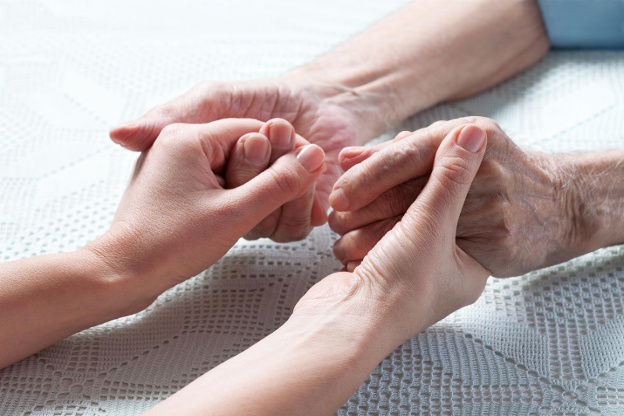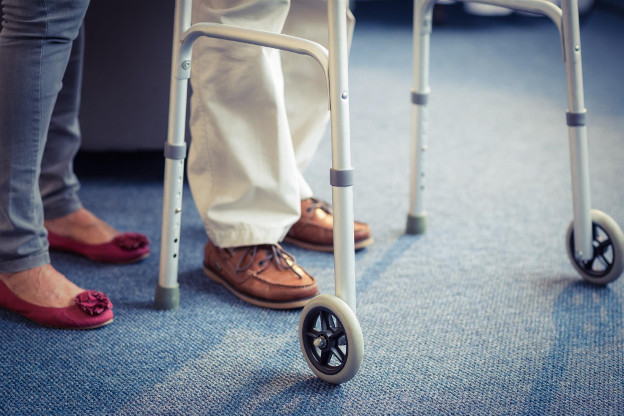PROMOTING INDEPENDENCE IN PERSONS WITH DEMENTIA: TIPS FOR CAREGIVERS
Adults diagnosed with dementia are faced with a disease that is irreversible and progressive. The loss of judgment, reasoning, memory, and communication skills lead to an inability to discern risk and danger. Dementia can limit a person’s ability to live independently, which can be very distressing for the individual and family members.
It’s vital for caregivers to embrace a patient-centered approach to care that allows people with dementia to maintain as much autonomy and control as possible, while still preserving their safety.

Long term care facility staff training programs that address how caregivers can help residents with dementia maintain independence-such as Medcom’s 7-part series on dementia care-can help improve quality of life for people with dementia. Family members of a loved one with dementia, especially primary caregivers, can also benefit greatly from such educational programs.
MAINTAINING INDEPENDENCE IS IMPORTANT TO PEOPLE WITH DEMENTIA
Ask people of a certain age, and they’ll likely tell you how important it is to them to maintain independence as they age. Most of us dread the idea of relying on others for our most basic needs like dressing, bathing, and going to the toilet.
The Alzheimer’s Association conducted surveys and interviews involving people with early-stage dementia. The Association found that these individuals have a strong desire to retain some level of independence for as long as possible, despite their condition. One interviewee stated:
“Let me do as much as I can [by myself] and help when I need it or get confused.”
People with dementia want to actively participate in their own care. Research shows that nursing home residents with dementia who have more independence in performing activities of daily living (such as dressing, bathing, and toileting) had better health-related quality of life. 1
KNOWING WHEN AND HOW TO HELP
One of the greatest challenges for caregivers-whether it’s a family member or healthcare professional-is knowing how much assistance to provide and when to provide it.

One of the simplest and most effective ways to determine whether the person needs or wants help is simply to ask. As another person interviewed by the Alzheimer’s Association put it:
“Ask me what I am comfortable doing on my own and what activities I think I need help with.”
Ahead, we’ll explore why it’s so important for people with dementia to continue doing things on their own (when possible) and how caregivers can help promote independence among people living with dementia.
First, let’s look at dementia statistics in the U.S., which help illuminate its scope and impact on the U.S. population. The need for comprehensive dementia care will only grow as members of the Baby Boom generation advance further into their senior years.
DEMENTIA STATISTICS IN THE U.S.
Dementia has major impacts on older individuals, families, and society. Consider the following facts and figures:2
- Alzheimer’s disease is the most common form of dementia, making up an estimated 60-80% of all dementia cases; it affects more than 5 million people in the U.S. and an estimated 44 million people worldwide.
- Alzheimer’s is just one type of dementia. Other types include vascular dementia, Lewy body dementia, frontotemporal disorders, and mixed dementia (a combination of two or more types of dementia).
- The vast majority (96%) of people with dementia are age 65 or older. Of the people with Alzheimer’s in the United States:
- 37% are age 85+
- 44% are aged 75-84
- 16% are aged 65-74
- 4% are under age 65
- More women than men have Alzheimer’s and other forms of dementia; nearly two-thirds of Americans with Alzheimer’s are women.
- Brain changes may begin as many as 20 years before symptoms appear.
- 1 in 3 seniors dies with Alzheimer’s or another form of dementia.
- Alzheimer’s dementia is underdiagnosed and underreported; this means that the number of people with Alzheimer’s is likely much higher than reported and that many people in the U.S. have Alzheimer’s but don’t know it.
- The estimated cost of Alzheimer’s-related health care and long term care expenses for people in the U.S. is $277 billion; Medicare and Medicaid (taxpayer-funded programs) will absorb the majority ($186 billion) of these costs.
- Family members and other unpaid caregivers provide more than 18 billion collective hours of care every year, valued at over $232 billion.
As of today, there is no cure for dementia. It will continue to have a significant impact on affected individuals and their loved ones. How can caregivers help those with dementia retain some of their independence and, in doing so, possibly even help slow the progression of the disease? We explore some ways below.

TIPS FOR CAREGIVERS: HELPING PEOPLE WITH DEMENTIA MAINTAIN THEIR INDEPENDENCE
It’s not uncommon for caregivers to get into the habit of assuming most of the day-to-day tasks of daily living for a person with dementia. In doing so, however, caregivers can unintentionally undermine the independence of those they care for.
Research supports this claim. A study conducted by psychologists at the University of Alberta in Canada showed that dementia patients who were too dependent on their caregivers were less likely to contribute to daily activities, which diminished their sense of self-worth.3
Here are things caregivers can do to help promote independence in the person with dementia:
- Encourage participation in daily activities . Particularly in the early stages of the disease, it’s important for caregivers to actively encourage persons with dementia to participate in daily activities, such as getting dressed and grooming, as well as household activities like watering plants and helping in the kitchen.
- Focus on the person’s abilities . In earlier stages of the disease, people may still be able to do many things on their own. Encourage their participation in daily activities-the “use it or lose it” principle is especially relevant for people with dementia. As the disease progresses, they may be able to do less. Focus on what they can do. If preparing meals is no longer possible, ask the person to set the table instead. If people can no longer tie their shoes, switch to sturdy slip-on shoes instead. If belt buckles are a challenge, opt for slacks with an elastic waistband. Some days will be better than others. Encourage people with dementia to try the activity again tomorrow if they’re unable to do it today.
- Encourage physical activity . Physical movement is vital not only for strength and flexibility but also for cognitive health. Regular physical activity may extend how long people with dementia are able to continue their daily tasks. Caregivers should encourage some physical activity every day, whether it’s a session of stretching or a walk around the neighborhood.

- Provide opportunities for social engagement . Dementia can be an incredibly isolating disease. Once diagnosed, it’s not uncommon for people with dementia to lose contact with members of their social networks. Social activities and community involvement can boost feelings of inclusion and give those with dementia a sense of meaning and purpose. Provide opportunities for them to participate in stimulating social activities that match their current ability, whether it’s a sing-along, arts and crafts, music, theater, or something else. The activities should promote self-esteem and should not involve new learning but, rather, should focus on maintaining current skills. Activities should be sensitive to the person’s preferences and cultural background.
- Coordinate care between all caregivers . This includes medical professionals, social workers, family members, and friends, as well as the person living with dementia. All involved should work together to meet the person’s medical, emotional, and social needs as the condition progresses. Caregivers should adjust their approach to reflect the changing day-to-day needs and abilities of the person. By doing so, they can help reduce frustrations and maximize the person’s independence.
- Create a safe, comfortable environment that reflects the person’s preferences and personality. Unfamiliar sensory experiences can feel overwhelming to the person with dementia. Crowds, bright lights, and excessive noise may trigger behavioral and psychological symptoms of dementia (BPSD), such as confusion and anxiety. This can lead to wandering or agitation. Whether the person lives at home or in a care facility, it’s important to minimize factors that can trigger BPSD and create an environment that is comfortable, safe, and reflects the person’s individual preferences and personality.

Caregivers have the unique opportunity to change how people with dementia and their family members experience the disease. By encouraging participation in suitable daily activities, caregivers can help the person with dementia maintain a sense of autonomy and control and reduce challenging behaviors associated with the condition. Ultimately, caregivers can help improve quality of life and, possibly, even slow the progression of the disease for those living with dementia.
Appropriate caregiver training is vital in long term care facilities serving patients with dementia. Medcom provides comprehensive DVD and online streaming courses that can be seamlessly incorporated into long term care staff development programs. Learn more below.
MEDCOM FEATURED SERIES: DEMENTIA CARE
Caregivers working with residents with dementia have a great responsibility to administer care that supports optimal function, maintains safety, and provides quality of life to those who have lost the ability to determine their own course in life.
Medcom offers a 7-part series designed to help long term care facility workers provide quality care for residents with dementia. Topics covered include:
- Alzheimer’s Care
- Communicating with Persons with Dementia
- Dementia Behavior Management
- Dementia Care
- Elopement (Leaving Premises) Prevention
- Family Issues with Dementia
- Promoting Independence for Persons with Dementia
These carefully constructed courses enhance employee engagement, which, in turn, can improve resident satisfaction and outcomes. For more information about our 7-part series on Dementia Care and to set up a free preview, please contact Medcom at 800-541-0253, or email customerservice@medcominc.com. Dementia Care programs are also available on DVD.
ABOUT MEDCOM
For over 50 years, Medcom has been a trusted education provider among healthcare professionals, students, patients, and their loved ones. Our vast library of products is used nationwide by universities, hospitals, long term care facilities, and mental/behavior health areas.
Medcom offers a complete suite of online education, including nursing CE programs, to help ensure quality care. Our award-winning products not only meet regulatory compliance, but the Medcom solution is cost-effective, meets in-service and continuing education needs, and boosts employee retention. To ensure the highest level of quality, we have worked with leading healthcare and professional organizations, such as the American Lung Association, John Hopkins Hospital, and Mayo Clinic. Learn more on our website.
SOURCES:
1. https://www.ncbi.nlm.nih.gov/pmc/articles/PMC4939554/
2. https://www.alz.org/alzheimers-dementia/facts-figures
3. https://era.library.ualberta.ca/items/c59cc088-6cc4-4425-a767-2f6bfc36ae83
